


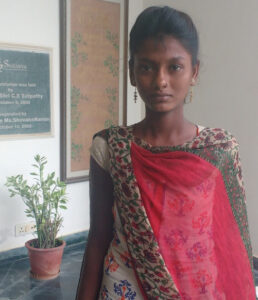 Shobha’s story
Shobha’s story
Shobha hails from West Bengal. Her family had migrated to Gurugram many years back in search of better opportunities. She lives in an extended family where every member is engaged in some kind of employment. Due to the difficult financial situation of her family, she worked as a domestic help to support her mother and was unable to go to school. At the same time, she shouldered the responsibility of educating her younger siblings. She understands the importance of education and sees it as a bridge linking her current state and future dreams. The challenging situations of her life have made her confident and courageous to take the responsibility of alleviating herself and her family from the pains of poverty.
Shobha has been attending the training sessions of Adolescent girls on Reproductive Sexual Health (ARSH) and Family Life Education (FLE) with the hope to make herself more empowered and well informed about the internal and external threats of life. From the very first session, she has been the leader of the group during presentations and activities. She grasps things easily and is attentive. She is fond of the sessions and motivates other girls of her community to participate too. At present, she is taking stitching classes at a nearby centre and dreams to open her own boutique in the future.
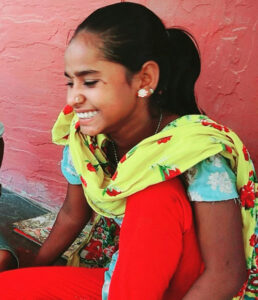 The inspiring story of Barira
The inspiring story of Barira
The inspiring story of Barira’s transformation – from a shy girl to an agent of social change has influenced many lives in and outside the Neemtala slum of Gurugram. Like many others, her family migrated to Gurugram from West Bengal in search of better opportunities. At 15, as the oldest child in the family, she looked after her four siblings while her father worked as a rickshaw puller and mother, as a domestic helper.
Throughout the day she had to keep making compromises with her childhood dreams as she endured her adverse social conditions where neglect, abuse, harassment and deprivation were her constant companions.
She did not realise that the time had come for her life to be transformed. Barira joined Sukarya’s training programme, the Adolescents Reproductive & Sexual Health and Family Life Education (FLE). These programmes were run exclusively for adolescent girls living in slums. The training sessions helped Barira open up and dispel the doubts she harboured. She displayed keen interest in learning about new topics and participated in all activities with fervour.
In no time she could feel her thoughts and world view changing. From feeling helpless like a victim, she began to believe she could be anything she set her heart and mind to. With hard work, perseverance and guidance she would be able to overcome all roadblocks. She went on to become a youth leader for programmes in her community. She always spoke passionately about the benefits that the programme would bring and how she herself was a product of these trainings. Many girls who later joined the programme said they wanted to be like Barira and follow in her footsteps.
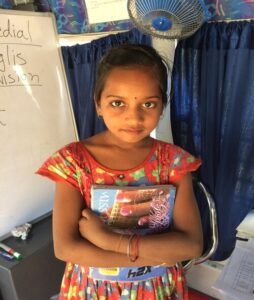 Doing her bit to create a safe and equal world: Habiba’s story
Doing her bit to create a safe and equal world: Habiba’s story
12-year old Habiba lives in a slum in Sector-57, Gurugram. Being the older of two sisters, she takes care of her siblings when her parents are away at work. Moreover, she manages household chores and supports her mother in cleaning, cooking and washing clothes. Despite the enormous work load at this tender age, she manages to attend classes without fail.
Initially, she was shy and hesitant to share her story and discuss what was happening in and around her slum. Nonetheless, she was an attentive listener who was alert to every action and gesture made by the facilitators and trainers. She soaked in each word they uttered and went back home and mulled over it trying to see how to apply it to her daily life and interactions.
She began to gradually see the injustice around her. How her mother was so over worked while her father and brothers never gave a helping hand. How her elder sister was made to drop out of school while her twin brother continued. How when it came to food, the girls were given leftovers after the menfolk had finished.
Habiba began to question these discriminatory behaviours. She learnt to take care of herself and identify things like good and bad touch. “I know when I see someone attempting to molest a girl, I have to scream and run, share such incidents with parents and dial the 1098 child-helpline number to get assistance”. She further adds, “I feel happy that I am getting so much knowledge which I can pass on to my friends and sisters”.
“Why look for a leader, when I can be one?”: Laxmi’s story
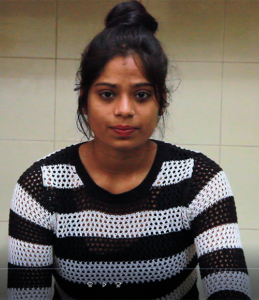
“We are fortunate to have such a training session in our slum locality as there is hardly any opportunity here to talk about adolescent health”, shares Laxmi, 19, from JJ Bandhu Slum pocket in Delhi. The batch has just started in this locality with adolescent girls and Laxmi was the first to hear about it and enrol herself.
Once she learnt about the curriculum, she was very excited and in no time had mobilised a dozen more girls to sign up. Her enthusiasm and people skills were not in vain. Nasim Ahamad, Coordinator, field operations at Sukarya who was also the facilitator of the training programme, immediately nominated her as the batch leader, much to Laxmi’s delight.
This further encouraged her to extend herself in supporting the group and spreading the key messages in her community.
The project team had observed that she had the potential to be groomed as a leader and resource person. With some gentle handholding and training she could be a torchbearer in her community and a change leader. They had seen girls like her inspire others and give them hope and courage to deal with life.
Laxmi says emphatically, “I always knew I would never stand up to injustice or atrocities committed on women particularly. But now I know how to win my battles and what to do to make a difference. The trainings at Sukarya and all our conversations on gender, empowerment, equity and justice have made me stronger because I can now confidently step out in the world and protect myself from exploitation of any kind.”
Debunking myths and misconceptions about sexuality: Rani’s story
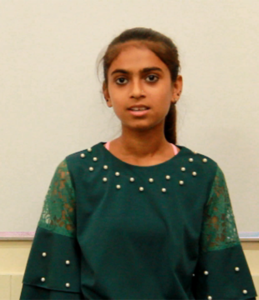
13-year old Rani lives with her three siblings and parents in the highly congested slum community of J.J Bandhu camp in Vasant Kunj, Delhi. Her father is a labourer and mother a house help.
Rani is a bright student and has managed to get good grades every year. She is now in Grade 7 and aspires to a teacher in a government school. She knows it will be difficult because to make the time to study in higher classes she will have to give up her domestic responsibilities. She is also clear that she will not get married like her sister, till she finishes her education.
She was introduced to Sukarya’s Adolescent Reproductive Sexual Health (ARSH) Programme where she attended six training sessions that oriented her along with other girls to different aspects of sexual and reproductive health. They learnt a lot about lifeskills, nutrition and other warning signs related to menstruation, pregnancy, sexually transmitted infections and contraception.
“She says, “the physiological and emotional changes brought about by adolescence had been so frightening to deal with, alone. I could not even talk to my mother or sisters about these things”. Thanks to the counsellors at ARSH, she knows so much and is happy to share these learnings with other girls who may not have access to correct information. Rani is outspoken and this quality has made her a role model amongst her contemporaries. She has been able to demystify many myths and misconceptions that abounded about SRH.
No shame in talking about sexual health: Priyanshi’s story
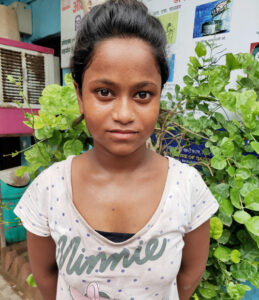
Priyanshi moved from West Bengal and joined her mother who has been living in the Tarachand camp in Delhi for the last eight years. She is now 13 years old and studying in a government school in Grade 7. She has two younger brothers.
Her mother works as a housekeeping staff for the Airport Authority of India and barely earns enough to feed her family of four. They live in miserable condition without access to basic amenities and health care. When asked about her father, she chose to remain silent with her eyes downcast. Her mother informed that her childhood had been traumatic seeing their father drunk and abusive every night. Showdowns were common and violent outbursts too, as he beat up the mother and hit out at the crying children. This forced her to move out of West Bengal, away from the clutches of her husband.
Sukarya’s Project team heard about the family and approached Priyanshi. She was motivated to join the training session. A quick learner, she emerged as one of the most active girls in the 3-month training programme conducted as part of the Adolescent Reproductive & Sexual Health [ARSH] and Gender empowerment initiative. She was chosen as leader and tasked with enrolling girls of her age to join. After going through the sessions, Priyanshi was very confident of herself and was comfortable with the trainers discussing everything related to personal health and safety.
Sharing her experience, she says, “when it comes to talking about reproductive health issues, adolescents prefer to seek help from relatives or friends but not health care professionals due to awkwardness and apprehension of being judged. The taboos associated with these topics makes it difficult to talk to anyone outside the family. But after the training we are reaching out to health workers because we know we will get access to correct information. In an emergency they will be able to guide us correctly”.
Priyanshi plans to tell her friends not to be embarrassed and ashamed about these issues. They can clarify their doubts and feel empowered with the knowledge, so that they can take better care of themselves.
 Saying no to child marriage: Suhana’s story
Saying no to child marriage: Suhana’s story
Suhana, 12, migrated to Gurugram with her parents and sister. Her father is a construction worker and mother works as a domestic help. Suhana, had to drop out of school in the 3rd grade and take care of siblings and do household chores while her mother went out to work. Life was full of difficulties and challenges and it seemed like a downhill journey with no ray of hope. Till she registered for Sukarya’s training programme the Adolescents Reproductive & Sexual Health (ARSH) and Family Life Education (FLE).
Suhana was a highly active and regular participant. During a session on “Life & social threats” she shared a story of her own family. She narrated how her uncle and aunt got married a few years back when they were teenagers. After the marriage, her uncle used to abuse her aunt physically and mentally. Suhana could never understand why her aunt had to put up with all that atrocity. The helplessness and anguish of the older lady left an indelible impression on her young mind and she resolved never to marry.
However, after attending the session on life and social threats, she got to know about the right age to get married. She learned that child marriage put a young girl in a precarious situation. It was important to wait till the age of 18 to tie the knot and shoulder marital responsibility. She got to know about the emergency helpline numbers where assistance was available 24×7 should she or any other girl need it. She realised that her aunt too had married when she was barely 15 and had three children by the time, she was 20. This made her resolve that she would say no to child marriage and not let any girl in her neighbourhood marry before she was of eligible age.
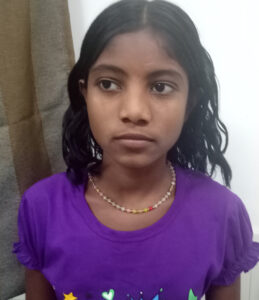 Experiencing the thrill of formal learning: Dalia’s story
Experiencing the thrill of formal learning: Dalia’s story
Dalia, 13, lives with her parents and six siblings in a slum in Gurugram. Her parents migrated from West Bengal in search of a better life and to work as daily wage labourers and domestic helpers. However, the harsh realities of living in an urban slum haunted her every single day. She realised that she lived in a very insecure environment where young women faced numerous problems on a daily basis.
The news of Sukarya’s ARSH and FLE programmes in their slum came as a blessing in disguise for Dalia’s family. Being the third sibling, Dalia was the first of her generation to attend any kind of education programme.
Regularly attending the training sessions of ARSH and FLE, Dalia learnt about menstrual health and other issues affecting women’s health and safety. She was completely unaware of menstrual health and hygiene, however after just a couple of sessions she started following all the tips given during the sessions. She became a strong advocate of menstrual hygiene in her locality and helped fight taboos surrounding menstruation.
Having witnessed child marriage from close quarters she had earlier thought of it as something normal. However, after learning about its physical and emotional impact on women, she came to realise that child marriage was actually a social evil. When her parents thought about getting her older sister married at the age of 16, she firmly stood against the idea and explained to them how it could affect her well-being.
Through the knowledge gathered from ARSH and FLE, Dalia now wishes to be an empowered young woman who would be able to shield other girls from any harm and in turn, empower them too. She feels that the experience of mentoring other young adults will help fulfil her dream of becoming a teacher and assisting other adolescents to feel empowered and protected. She would never have known all this had she not attended the ARSH and FLE sessions that were held by Sukarya. She is now motivated to join a night school where illiterate people like her can go and study.
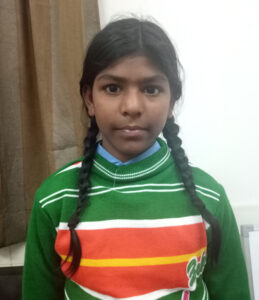 Safety first and foremost: Sarfana’s story
Safety first and foremost: Sarfana’s story
Sarfana has just turned a teenage. She does not know what it means to be an urban teen even though she lives in India’s millennium city, Gurugram. She, her mother and six brothers and sisters live in one room which is part of a larger house where six other families reside. Her father abandoned them when she was a baby. Her two elder brothers work in local tea shops and support their mother to run their household.
The biggest problem Sarfana faces is that of eve teasing and harassment. Stepping out of her home and getting on to the street means exposure to dozens of ruffians who pass lewd remarks and mock her and other girls. The problem has become so acute that the girls fear for their safety and try and return home before it gets dark. The feeling of insecurity never leaves them as they keep looking over their shoulder to see if they are being followed.
Attending the training sessions of ARSH and FLE for six months has been a major confidence boosting exercise. The girls have learnt how to protect themselves, what to do if provoked or attacked in any way and who to go to and what kind of redressal mechanism to adopt. More importantly, they have been taught how to pre-empt such acts and to recognise early signs of trouble.
Seeing the confidence of the girls a lot of the boys have already retraced their steps. The girls are not letting their guard down but they do feel a lot more secure in the knowledge that they can weather these storms with skills, guidance and courage.